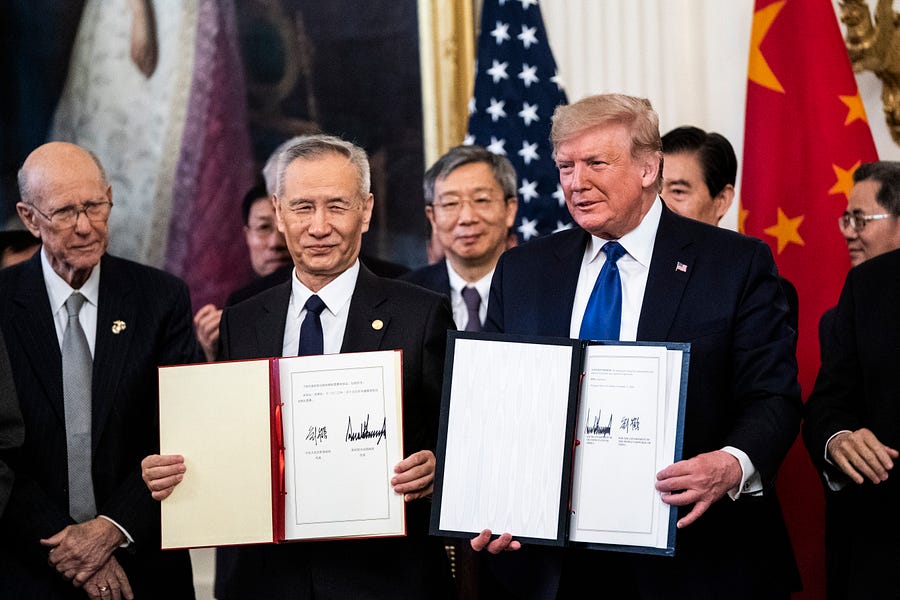A new band of conservatives has joined progressives’ longstanding drive to save Americans from the scourge of libertarian economics, and one of their primary targets is … U.S. trade policy?
Apparently so, according to the head of the newly formed American Compass, Oren Cass. He tells the Washington Post that “an actual conservative economics would be much more skeptical of free trade than is libertarian economics,” which he and his colleagues elsewhere have blamed for decades of U.S. trade policy and its alleged destruction of the American manufacturing workforce. Leaving aside the laughable assertion that Republican policy is rife with Hayekian fundamentalism, there are two fatal flaws to Cass’s argument: First, contrary to conventional wisdom, the United States is hardly a Ricardian bastion of free trade. Second, to the extent modern American trade policy has reduced import restrictions, this reflects not blind devotion to markets or economic theory but instead core foreign policy concerns, blatant mercantilism, and, a widespread acceptance that, while trade liberalization certainly wasn’t costless, the alternative was far worse. These facts reveal that the new “pragmatists” in Washington, whose default position is trade skepticism and protectionism, are the real ideologues.
Since the 2016 elections, a common refrain from the right is that the rise of American populism was a response to runaway globalization and its deleterious impact on America’s working class. It’s true that U.S. tariff rates have (until recently!) declined consistently since World War II, and the United States has entered into several “free trade” agreements since the 1990s. But as I explained in 2016, these rudimentary proxies for trade liberalization belie the fact that, over the same period, the United States has continued to use tariffs and quotas to protect politically powerful sectors and has become a world leader in the use of non-tariff barriers to achieve similar ends.
The laundry list of such methods includes anti-dumping and anti-subsidy duties, intellectual property-based import bans, “Buy American” and other domestic procurement restrictions, export subsidies, technical regulations and licensing laws, shipping restrictions (the Jones Act), investment restrictions, and export licensing systems. Far from removing these restrictions, moreover, Congress has in many cases—and certainly on trade remedies—moved to make them even more restrictive (and beneficial for the domestic industry that lobbied for them), while the executive branch has vigorously defended such measures at the WTO and in FTA negotiations.
And so anyone with even a rudimentary understanding of our trade policy will sigh audibly when confronted with the trendy assertion that the United States is some sort of free trade paradise. Instead, as I explained back in 2016, the continued prevalence of U.S. protectionism.
demonstrate[s] quite clearly that American manufacturing and agribusiness, as well their workers, are, in fact, a far cry from being the ‘unprotected’ victims of ‘unfettered’ free trade [and] should indicate that the commercial failures of U.S. steel or textiles or other sectors, as well the suffering of America’s working class, have not resulted from a lack of trade protectionism. There is plenty of protection available, and many U.S. industries take full advantage.
In retrospect, I should have included services there too, as the United States still maintains significant barriers to trade in many essential services like education and health care, despite substantial technological advances and a glaring need for more competition in these areas.
It’s true that modern American trade policy has undoubtedly reduced many U.S. tariffs and other import restrictions. But blaming this liberalization (as if low tariffs are a bad thing) on “libertarian” economic policy, is manifestly ridiculous. For example, the overwhelming motivation for the General Agreement on Tariffs and Trade (GATT), which created the multilateral trading system and eventually became the WTO, was foreign policy—to prevent the type of regionalism that started two world wars—not a desire for economic growth, specialization, or consumer empowerment. To this day, these and other foreign policy concerns often dwarf economic ones when it comes to U.S. trade agreements.
Furthermore, the modern U.S. trade policy structure, starting with the Reciprocal Tariff Act of 1934 and continuing through the Trade Act of 1974 and “Trade Promotion Authority” (TPA) today, is grounded in mercantilism, not free trade. U.S. trade agreements, responsible for the bulk of import liberalization, are negotiated pursuant to a laundry list of congressional negotiating objectives that are heavy on exports, reciprocity, and labor and intellectual property protections, yet never once mention import liberalization or U.S. consumer benefits (though “rais[ing] living standards” does get a passing reference). Our trade negotiators fight to balance import “concessions” with market access gains (e.g., lowering foreign tariffs), and final agreements often maintain or even increase protection for “sensitive” industries through arcane, heavily-lobbied provisions like “yarn forward” rules of origin which require textile and apparel imports to contain significant amounts of domestic content.
Indeed, real free traders—including, of course, libertarians—have long been critical of this mercantilist system, begrudgingly accepting its political necessity while often warning that its structure and rhetoric might eventually breed more trade skepticism and protectionism, not less. Even supposed “free trader” presidents like Reagan, Clinton, and George W. Bush used such a system, not unilateral liberalization (the “libertarian economics” ideal), to advance their trade agendas. They frequently embraced outright protectionism, too.
To the extent that U.S. policy has fostered import liberalization, it has done so not because of a blind, idealistic embrace of Adam Smith but instead due to the cold reality of protectionism’s costs and myriad failures. The 1934 Reciprocal Tariff Act, for example, was a congressional response to more than a century of corrupt, ineffective tariff legislation that culminated with the Smoot-Hawley debacle of the Great Depression. The economics, of course, back up this history : as I wrote in 2017, “a vast repository of academic analyses and contemporaneous reporting… show that American trade protectionism—even in the periods most often cited as ‘successes’—not only has imposed immense economic costs on American consumers and the broader economy, but also has failed to achieve its primary policy aims and fostered political dysfunction along the way.” In short, America kept trying protectionism; it kept failing; so we eventually stopped trying as much.
Subsequent studies show similar conclusions. For example, IMF economists in 2018 examined data for 151 countries over 51 years (1963-2014), and found that “tariff increases lead, in the medium term, to economically and statistically significant declines in domestic output and productivity,” as well as more unemployment and higher inequality. A 2019 Mercatus Center report, moreover, found the primary beneficiary of US trade remedy protection between 1994 to 2015 to be the higher-paid CEOs of the steel, textile and other companies that won the protection, not their US workers. For these reasons (and others), there is probably no area on which more economists—on the left, right and center—agree than general support for trade liberalization and opposition to protectionism. As such, historical elite support for free trade isn’t “libertarian economics”; it’s just “economics.”
The Trump administration’s adventures in protectionism make it so that one need not look to the distant past to see the costs of abandoning open trade. As helpfully summarized by economist Kadee Russ in October 2019, recent studies show significant harms from Trump’s tariffs, in large part due to U.S. manufacturers’ global integration:
Economists across academic and policymaking institutions have produced a number of different estimates of the impact that changes in trade policy since the start of 2018 have had on the U.S. economy. The lowest estimates involve only the direct incidence of the new taxes on consumers. The highest estimates include the direct costs of the tariffs, costs related to distortions the tariffs generate in firm and household behavior, and the drag on firm activity that increased uncertainty about trade policy has brought. Taking the full range of estimates into account, the new trade policy regime implemented in 2018 through June 2019 is likely to result in an average cost per U.S. household between $500 and $1,700 a year.
Since then, Federal Reserve economists found that Trump’s tariffs, and the retaliation that they inevitably invited, significantly harmed U.S. manufacturers’ output and employment. Russ calculated a loss of approximately “75,000 … jobs in manufacturing attributable to the March 2018 tariffs on steel and aluminum, not counting additional losses among U.S. exporters facing tariffs other countries levied in retaliation.” Another group of economists in January 2020 found that the import tariffs also hurt U.S. manufacturing exports, to the tune of about $900 per manufacturing worker. At the same time, the U.S. steel industry is—by the Trump administration’s own admission—not thriving; political lobbying on trade has increased; American companies have been reduced to begging for tariff relief through Kafkaesque “exclusion” processes that often come up empty; and numerous domestic lawsuits have ensued.
Recent U.S. policy therefore strengthens the economic case for freer trade, yet … here we are.
This is not to say that a policy of open trade is always, in every case, automatically the best policy. Or that adjustment to trade “shocks” won’t be difficult for those involved. However, economics and history repeatedly teach us that the clear default policy position should be in favor of freer trade, that the theoretical exceptions to this rule are few and far between, and, perhaps most important, that the exceptions’ actual implementation—see, e.g., the aforementioned “national security” tariffs for steel and aluminum—will often be corrupted by the political process to the point that the measures produce far more harm than good.
All of this raises the inevitable question: who are the real “fundamentalists” here after all? The folks whose theories are backed by history, economics, and ample, real-world experience, or the ones demanding a new default position that ignores all of this reality and blames the inevitable and often-difficult disruptions caused by a market economy, as well as a litany of perceived social ills, on a Stonecutters-esque cabal of libertarian market-worshippers?
The answer seems pretty obvious to me, but, then again, I’m not trying to start a political movement.
Scott Lincicome is an international trade attorney, an adjunct scholar at the Cato Institute, and a visiting lecturer at Duke University. The views expressed herein are his own and do not necessarily reflect those of his employer.
Photograph of President Donald J. Trump and Chinese Vice Premier Liu He by Jabin Botsford/The Washington Post via Getty Images.








Please note that we at The Dispatch hold ourselves, our work, and our commenters to a higher standard than other places on the internet. We welcome comments that foster genuine debate or discussion—including comments critical of us or our work—but responses that include ad hominem attacks on fellow Dispatch members or are intended to stoke fear and anger may be moderated.
You are currently using a limited time guest pass and do not have access to commenting. Consider subscribing to join the conversation.
With your membership, you only have the ability to comment on The Morning Dispatch articles. Consider upgrading to join the conversation everywhere.